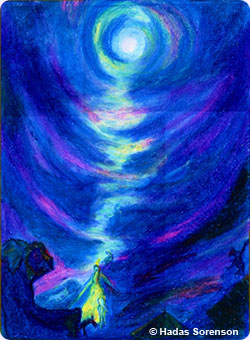Psychosophy
The term Psychosophy was used by Rudolf Steiner in a cycle of lectures held in Berlin, in November 1910. It was intended as the foundation for an Anthroposophical based psychology, to be studied in context with two other cycles of lectures which made a total of 12 lectures in this series: Anthroposophy (Oct. 1909), Psychosophy (Nov. 1910) and Pneumatosophy (Dec. 1911).
My dear friends, you have identified yourselves
with a movement in which your store of knowledge can increase if you think of
your present knowledge as a karmic fact.
In that way, you will have arrived at a cross-roads, a vantage point
from which vigorous co-operation in this work is clearly discernible as a task
enabling you, now, or in a future incarnation to serve humanity. Do not think of that as an abstract ideal,
but keep constantly returning to it in a practical way. This work must be made to bear fruit.
(Rudolf Steiner, Psychosophy, November 1st-4th, 1910)
Psychosophy was intended by Rudolf Steiner as the study of the human soul in its position between body and spirit. This threefold image of man is a fundamental element of Anthroposophy—as a philosophy, science, and path of spiritual development, in which Psychosophy is one aspect.
Psychosophy strives to make conscious the experiences the soul undergoes in relation body and spirit, and becoming conscious of the inter relationship between these three levels of soul experience, we can experience how each illuminates and gives reality and meaning to the other.
- Anthroposophy—these lectures offer an understanding of the human soul in relation to the physical world, through the activity of sensing and to the subtle processes that structure and form the human body
- Psychosophy—these lectures describe what we can know of the human soul on the basis of direct observation of oneself and others (experienced through the soul's inner life)
- Pneumatosophy—these lectures portray the relationship of the soul life to the spiritual world (appearing through the core of one's being), particularly with how to awaken the individual spirit life and how to discern between illusory and genuine spiritual experiences.
A deep
study of Steiner's Psychosophy: "will result in ways of understanding soul life that
one will not find expressed anywhere else in the whole discipline of
psychology. More than that, anyone who works carefully with these lectures will
find that the beginning of an increasingly conscious soul life becomes
possible" (Sardello in Steiner, 1999, p.viii)
Psychophonetics is based on working with body, soul and spirit, using a methodology of phenomenological observation of the human soul and speaking from soul, through the language of experience which has been developed as the literacy of experience. These lectures, and in particular, psychosophy, provide a practical model, road map, language and laboratory for a comprehensive study and practical transformation of human experience based on a spiritual conception of humanity, evolution and the Earth.
Sardello emphasises the importance of when we deeply read and work with these lectures: “it is impossible to come away from that encounter without realizing that the modern initiatory path of anthroposophy is a spiritual-psychological endeavour” (p.x).
Steiner's Psychosophy Lectures (there are two different translations and editions of these lectures)
Steiner, R. (1999). A psychology of body, soul, and spirit. (M. Spock, Trans.). New York: Anthroposophic Press. This edition has an introduction by Robert Sardello.
Steiner's Psychosophy lectures can be accessed on the internet by clicking on the following links
Lecture 1: The elements of the soul life
Lecture 2: Action and interaction of the human soul forces
Lecture 3: At the portals of the senses
Lecture 4: Consciousness and the soul life
The psychosophy lectures are best studied in the context of all 12 lectures, and the content list and links for all 12 lectures in this series can be accessed on the following link: https://rsarchive.org/Lectures/WisdoMan/WisMan_index.html
Psychophonetics is based on working with body, soul and spirit, using a methodology of phenomenological observation of the human soul and speaking from soul, through the language of experience which has been developed as the literacy of experience. These lectures, and in particular, psychosophy, provide a practical model, road map, language and laboratory for a comprehensive study and practical transformation of human experience based on a spiritual conception of humanity, evolution and the Earth.
Sardello emphasises the importance of when we deeply read and work with these lectures: “it is impossible to come away from that encounter without realizing that the modern initiatory path of anthroposophy is a spiritual-psychological endeavour” (p.x).
Steiner's Psychosophy Lectures (there are two different translations and editions of these lectures)
Steiner,
R. (1971). The wisdom of Man, of the soul, and of the spirit: Anthroposophy, Psychosophy,
Pneumatosophy.
12 lectures given in Berlin:
Oct. 23-27, 1909; Nov. 1-4, 1910
& Dec. 12-16, 1911. (S. & L. Lockwood, Trans.) New York:
Anthroposophic Press
Steiner, R. (1999). A psychology of body, soul, and spirit. (M. Spock, Trans.). New York: Anthroposophic Press. This edition has an introduction by Robert Sardello.
Steiner's Psychosophy lectures can be accessed on the internet by clicking on the following links
Lecture 1: The elements of the soul life
Lecture 2: Action and interaction of the human soul forces
Lecture 3: At the portals of the senses
Lecture 4: Consciousness and the soul life
The psychosophy lectures are best studied in the context of all 12 lectures, and the content list and links for all 12 lectures in this series can be accessed on the following link: https://rsarchive.org/Lectures/WisdoMan/WisMan_index.html

